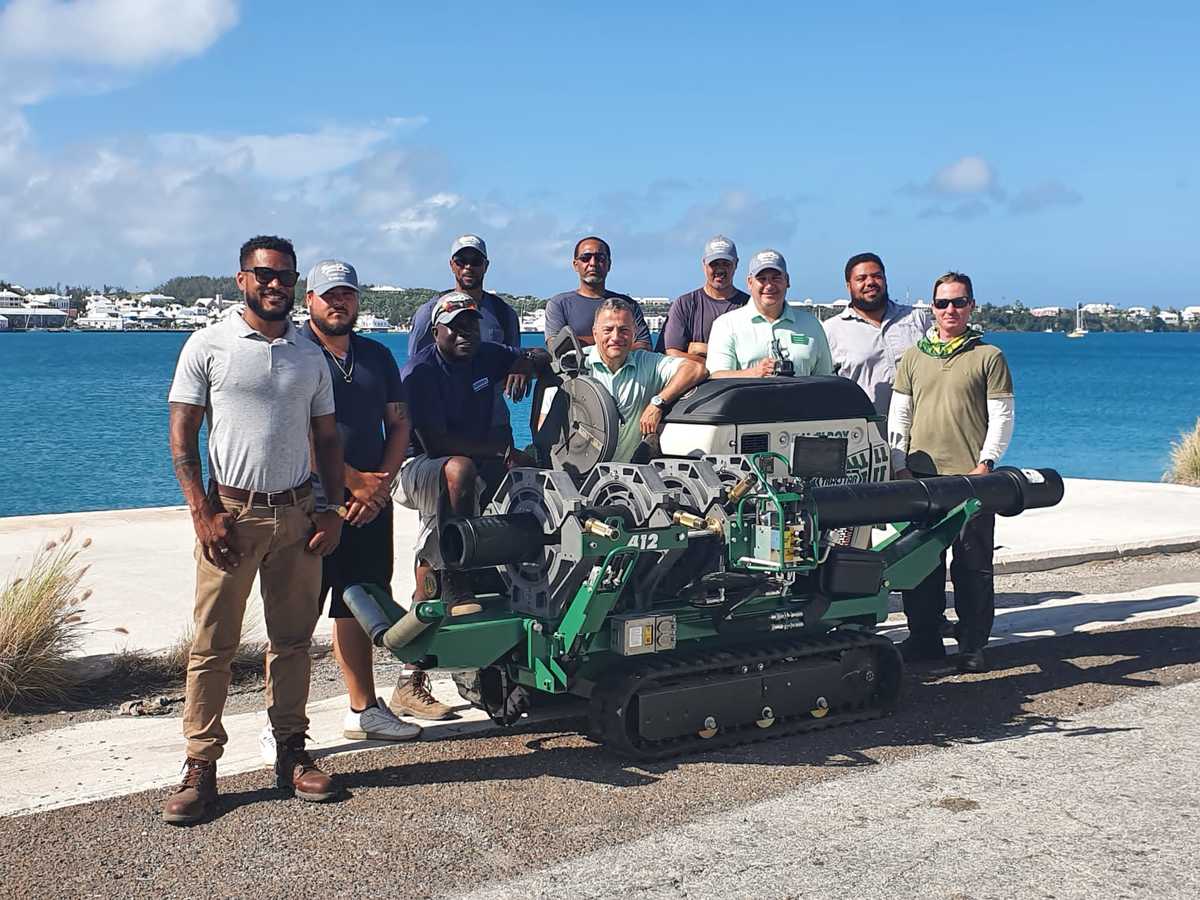Bermuda has been in dire need of finding a way to provide potable water, sanitary sewer and reclaimed water infrastructure for the Parish of St George’s. The current infrastructure is over 80 years old, and according to officials, it is far beyond its lifecycle and failing with multiple leaks and other losses.
The Ministry of Public Works (MPW), working with the Bermuda Land Development Company (BLDC), initiated a project to create a water, wastewater, and resource recovery facility for the Parish of St George’s. The conceptual design for the Bermuda Water and Wastewater Master Plan (WWMP) began back in 2016, when Associated Engineering, a Canadian consulting and engineering firm, was awarded the bid from the government to oversee the creation of the Master Plan.
In Phase 1, the project requires the fusion of more than 100,000 linear feet of HDPE pipe of sizes ranging from 2in to 8in.
“With the sheer magnitude of the project, it became clear that HDPE pipe would become the new local standard for buried water and wastewater infrastructure. It also brought to light that Bermuda would need a larger pool of certified contractors,” says Stephen Tucker, Project Manager, Bermuda Land Development Company (BLDC).
Critical matters call for sustainable solutions
The island has been plagued by problems with its water and wastewater supply. With no freshwater springs, rivers or lakes, Bermuda relies on a combination of solutions.
Most residents use rainwater collected from roofs and piped into household water tanks, or in the absence of rain, treated water from water trucks. This treated water is sourced from seawater wells and underground lenses, which are layers of fresh groundwater that lie on top of heavier saltwater.
There are several properties that do not have their own water tank for storage so they must rely on a centralized system for direct supply. The source of water in this instance comes from the island’s desalination plant or the government’s rainwater collection tank.
In 2017, government officials from Bermuda attended the Alliance for PE Pipe Roadshow where they learned more about the durability of HDPE. At this point, they had been working for years to figure out a solution to their water woes, and it would be three years after this visit before they would officially decide to use HDPE for their WWMP.
In February 2020, Chicago-based Milhouse Engineering & Construction was retained by BLDC to provide program management and some engineering services. Milhouse developed an overall Phase 1 execution plan that outlined the scope of work. Phase 1 includes seven tender packages that were segmented to break up the work that needs to be done. This phase is projected to be complete by February 2022 and will cost an estimated $30m. This is the first phase of potentially eight phases for the Master Plan.
Beyond this, a build-out timeline to upgrade services to Central and Eastern areas of the island is expected to be completed by 2030. The total cost of the build-out program is anticipated to cost $150m. It includes a major wastewater treatment plant and HDPE pipe infrastructure corridor.
Training delayed due to pandemic
A critical component of work on Phase 1 involves making sure contractors associated with the project are certified to operate small and medium butt fusion equipment to successfully fuse high-density polyethylene pipe (HDPE).
The project’s Program Management team determined that while there were several local trenching companies, only three companies outside of the Bermuda Government were experienced in the butt fusion of HDPE pipe.
In March 2020, conversations began in Bermuda about bringing in McElroy trainers after the purchase of some TracStar® and Pit Bull® machines; however, those efforts were delayed by Covid-19. Despite the delay in training, work continued on the WWMP, but it shed light on the importance of having contractors certified. To ensure that there are enough qualified contractors throughout the country, all pre-qualified contractors for the WWMP were invited to nominate up to two people from their company to participate in the course.
In May 2021, the Ministry of Public Works, Lt. Col. The Hon. David Burch, JP, MP, provided a project update to Bermudians. “This massive undertaking involves the trenching of much of the main roads in St George’s and in Southside to completely replace the infrastructure from piping, pumping stations, water producing plants and waste treatment plants. This will bring relief to the long-suffering residents of these areas providing reliable water and wastewater services.”
Setting an industry standard on the island
McElroy International Sales Manager Juan Quintero and International Technical Specialist Francisco Caballero recently conducted fusion training in Bermuda for 24 people.
The certified training was structured based upon the American Society for Testing and Materials International Standard (ASTM). It involved both online and hands-on sessions. Students must pass both a written and hands-on test, demonstrating their understanding of all course content. “Francisco and I feel honoured and proud to be part of the solution,” says Quintero.
Burch says: “The ultimate goal with all these courses is to expand and strengthen the industry. It is the kind of initiative that addresses the country’s need to get people trained, certified, working, earning and providing for their families. Their valuable labour is transforming Bermuda’s infrastructure for the better.”
Of the 24 students, 16 received their certifications during the June training. Two are certified in manual operation and 14 received full McElroy small & medium butt fusion operator certification which is valid for two years. They were all recognized during a televised presentation on 1 July led by Lt. Col. The Hon. David Burch, JP, MP, who declared this type of certification to be the NEW local standard for installing buried water lines.
The island is investing in the livelihood of Bermudians and the impact of this project will flow into future generations.











